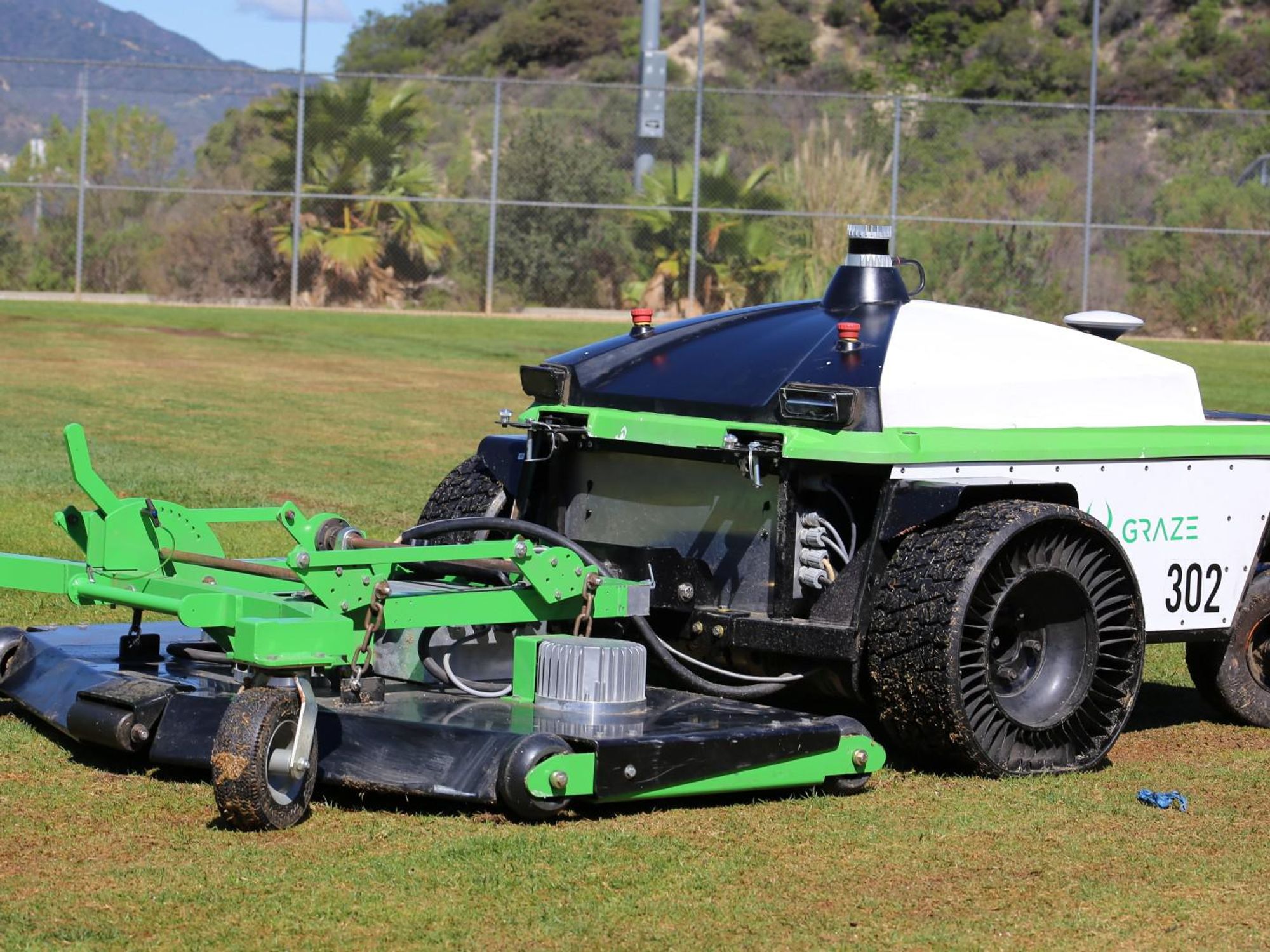Santa Monica Startup Graze Wants to Make Lawn Mowing Electric (and Autonomous)
Decerry Donato is a reporter at dot.LA. Prior to that, she was an editorial fellow at the company. Decerry received her bachelor's degree in literary journalism from the University of California, Irvine. She continues to write stories to inform the community about issues or events that take place in the L.A. area. On the weekends, she can be found hiking in the Angeles National forest or sifting through racks at your local thrift store.

Is there any worse sound to wake up to than a gas-powered lawn mower? Not only are they a noise pollutant, but they are clunky environmental ones as well. Insert Graze, a Santa Monica-based startup looking to change the landscaping industry by building electric, autonomous lawn mowers.
On Tuesday at the Glendale Sports Complex, Glendale Mayor Paula Devine announced that the city will be the first in Los Angeles County to join Graze’s pilot program, allowing Glendale facilities like Sports Complex to its equipment. In exchange, the startup will be getting free beta-testing research.
Graze CEO John Vlay said that he hopes other municipalities will follow Glendale’s lead. “Gas-powered mowers are just so polluting and have been unregulated for so many years,” Vlay, a 30-year veteran of the landscaping industry, told dot.LA.

Graze CEO John Vlay.
Image courtesy of Graze
The showcase came five months after Gov. Gavin Newsom signed a new law that bans the sale of new gas-powered landscaping equipment in an effort to curb emissions. (The new law takes effect at the start of 2024.) According to Environmental Protection Agency data, gas-powered lawn mowers account for 5% of total air pollution in the U.S.
As a gathered crowd listened to Vlay speak, one of Graze’s machines, roughly the size of a go-cart, mowed the Glendale Sports Complex grass. The sound that emitted from the mower was minimal compared to gas-powered mowers; Vlay didn’t even have to use a microphone to be heard.
Three engineers were onsite and paraded the mowers across the field using a tablet that mapped the perimeter and locked in the boundaries that the mower must stay in.
From there, the mower continued to make parallel passes, at 1.5 meters per second, throughout the field. The battery life of one mower can last up to eight hours, while the mowers have also been tested on rocky and undulated terrain.
A Graze mower consists of two large sections. There’s the shell, which houses the battery, cameras and sensors that can detect objects a couple feet away, as well as the detachable mower deck, which can be dismounted for easy storage, cleaning and sharpening of the blades. Vlay boasted that the detachable mower deck was built with future attachments in mind, such as a leaf blower or golf ball picker.
Graze autonomous electric lawnmower demonstrationVideo by Decerry Donato
Currently, Graze has four robots completed, and its team is in the process of building more for future pilot programs that cities like Glendale may want to adopt. (The startup says it has secured over 400 pre-orders since launching 2017.) Though he did not disclose how much each unit will be sold for, Vlay said Graze’s business model is focused on “robot-as-a-service,” which would charge users for the machine per acre mowed and based on how difficult the mowing will be. With crowdfunding, Graze has raised over $9 million in funding split between 6,200 investors.
Vlay believes that the product will sell itself as more than just an eco-friendly option. “It really becomes a Swiss Army knife of lawn mower equipment,” he noted while watching the machine whir around the field quietly.
- Future Acres Signs Deal to Bring Robots to More Farms - dot.LA ›
- Hundreds of Delivery Robots Are Coming to Los Angeles - dot.LA ›
- Moxie the Robot Helps Children With Autism Through AI - dot.LA ›
Decerry Donato is a reporter at dot.LA. Prior to that, she was an editorial fellow at the company. Decerry received her bachelor's degree in literary journalism from the University of California, Irvine. She continues to write stories to inform the community about issues or events that take place in the L.A. area. On the weekends, she can be found hiking in the Angeles National forest or sifting through racks at your local thrift store.





 Image Source: Skyryse
Image Source: Skyryse